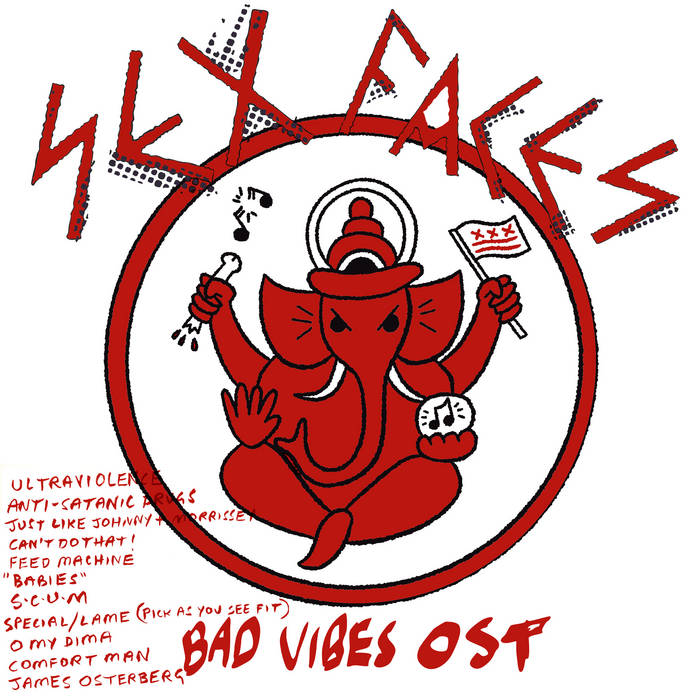
Trigger "Second Round"

Sexfaces "Bad Vibes OST"
In the sticky-floored underbelly of Washington DC, where the amps buzz louder than the city’s bullshit, SEXFACES have been brewing something gnarly. Their debut full-length, BAD VIBES OST, is a full-noise, zero-fluff slab of punked-up nihilism. Recorded and mixed in April 2024 under the ever-present shadow of Boner 4Ever by Dan Angel and produced by Ben Schurr, this 11-track dose of chaotic energy is the sound of a band that knows exactly what it’s doing — and doesn’t care if you like it or not.
SEXFACES ain’t here to play nice. Jacky Cougar (Des Demonas, Thee Lolitas) pounds the drums like they owe him money, while Sal Go (Stop Worrying & Love the Bomb, The NVs) saws through the noise with guitar that’s equal parts bratty and brutal. Hana Racecar (Tadzio, Coven Tree) layers in viola with a sneering elegance, and FiFi Allin (TK Echo, Et At It) slings basslines that punch and swerve. Together, they churn out a sound that drags the droney madness of the Velvet Underground through the gutter, filters it through The Fall’s acerbic wit, and ties it all together with the punk attack of The Damned and the scuzzy swagger of Royal Trux.
If you like your rock ‘n’ roll with a side of bloodshot eyes and bad decisions, BAD VIBES OST is for you. SEXFACES have arrived, and they’re not cleaning up after themselves.

Psychic Pigs "Psychic Pigs EP"
Rock & roll lifer Brandon Welchez is back with 10 tracks of grimy, unhinged punk with new band Psychic Pigs! Primarily known as one half of psychedelic-bubblegum warriors Crocodiles, the new self-titled Psychic Pigs LP finds him in a similar mode to his previous projects Flowers of Evil and (Slovenly Recordings alumni) Xenu & the Thetans. The tunes range from driving Wipers-esque ruminations on our sick society to swaggering scum-rock that would make Sonny Vincent and his Testors proud. Or as one keen ear noted: “It sounds like if ‘Machine Gun Etiquette’ was recorded in Hermosa Beach.” The record, however, was not recorded in Hermosa Beach but in London with superstar producer Jonah Falco (Fucked Up, Career Suicide, Boss). Fueled by strong beer and Jamaican food, the duo (Jonah on drums and production, Brandon on guitars and vocals) cranked out the album over the course of 4 days. It is now our pleasure to unleash Psychic Pigs on the world. If speedy, manic punk is your thing, it’s time to get down in the dirt with the Pigs!

emptyset "Dissever"
emptyset’s sixth album builds on their ongoing exploration into the histories of electronic sound and media across the 20th century, considering the intertwined evolution of cosmic rock, minimalism and electronic music, viewed through their prospective dreams and overlapping technological ambitions. The compositions across Dissever draw threads from these pioneering production methods emerging in parallel across the late 1960’s, considering the cross talk between these fields and their radical intentions to carve out the future from differing paths, traversing the mystical and modern, while incorporating elements of the transformative, hypnotic, expansive and transcendent to define new principles within sound.
The arrangements, performed live and captured in single takes, emerged across a series of sessions at long term collaborator Mat Sampson’s recording studio in Bristol. This process revisited early hardware, spatial and multitrack recording techniques to create a dynamic body of material that could look back to these foundational musical forms and converge them through the lens of a reimagined timeline, cultivating a transmission from 1969 to the present and a sensory bridge to the past.
Dissever was first presented at Tate Modern as a live performance to accompany the exhibition Electric Dreams, a large-scale survey of the global history of art and technology, which built further on the improvisatory nature of the compositions and their evolving performative possibilities. The ideas and methods of the album were equally anchored through the duo’s parallel explorations, notably within Ginzburg’s work with the transnational multi-instrumental group Osmium, and Purgas’ research and installations uncovering the sonic histories of South Asia.